University Health Care Report: Bariatric Surgery and Ulcer
VerifiedAdded on 2019/09/23
|10
|2395
|388
Report
AI Summary
This report analyzes a health care case study focusing on a patient, Mr. C, who is considering bariatric surgery and is diagnosed with a peptic ulcer. The report explores the appropriateness of bariatric surgery for obesity, discussing its effectiveness compared to non-surgical options and potential cardiovascular benefits. It delves into the patient's condition, including hypertension, high cholesterol, and elevated triglycerides, and recommends a low-sodium diet and exercise. The report also examines the medications prescribed, such as Mylanta, Ranitidine, and Sucralfate, and discusses potential problems. It also highlights the importance of health management, diet patterns, activity, exercises, and sleep patterns to aid in the patient's recovery. The report concludes with a discussion on the implications of the patient's condition and treatment.
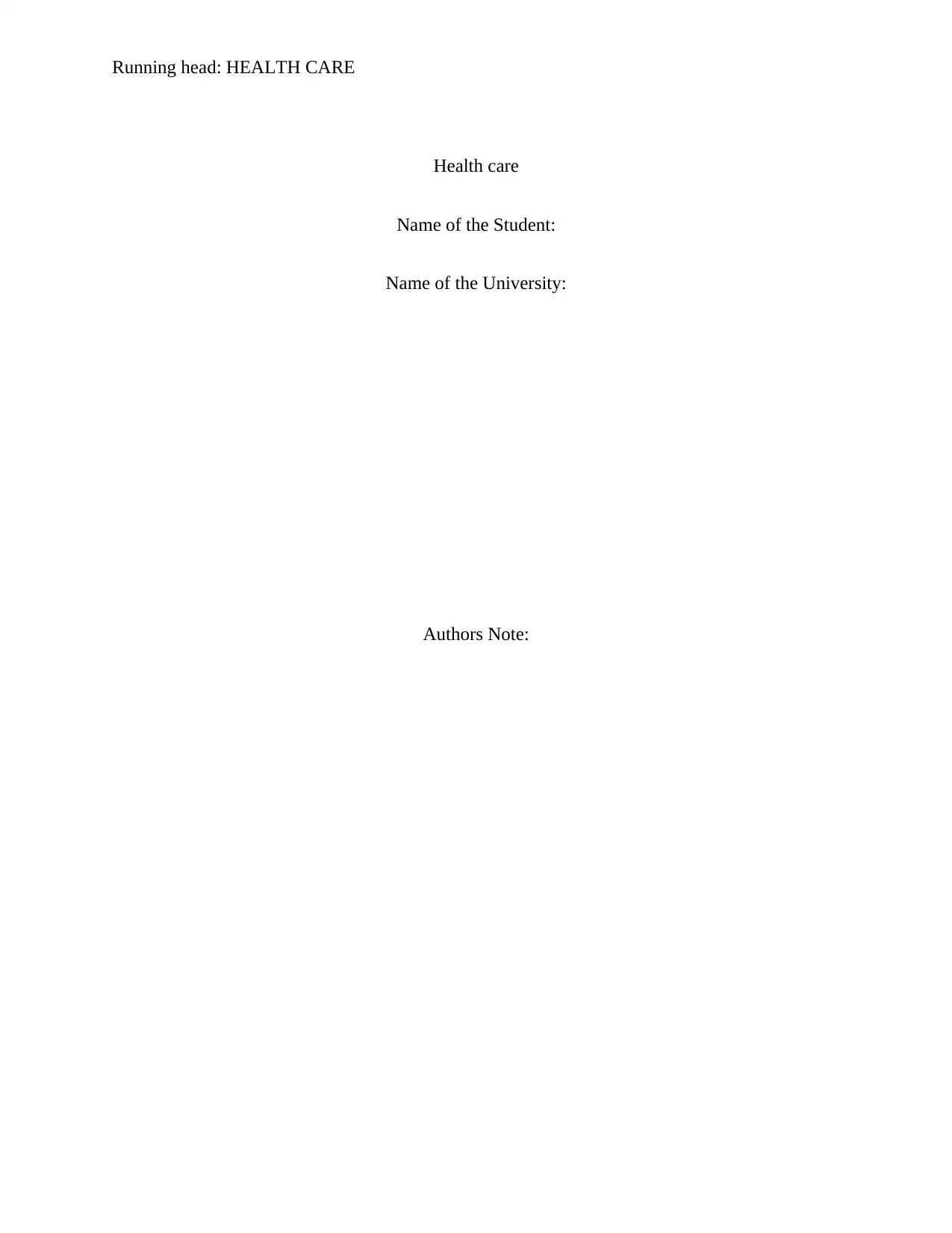
Running head: HEALTH CARE
Health care
Name of the Student:
Name of the University:
Authors Note:
Health care
Name of the Student:
Name of the University:
Authors Note:
Paraphrase This Document
Need a fresh take? Get an instant paraphrase of this document with our AI Paraphraser
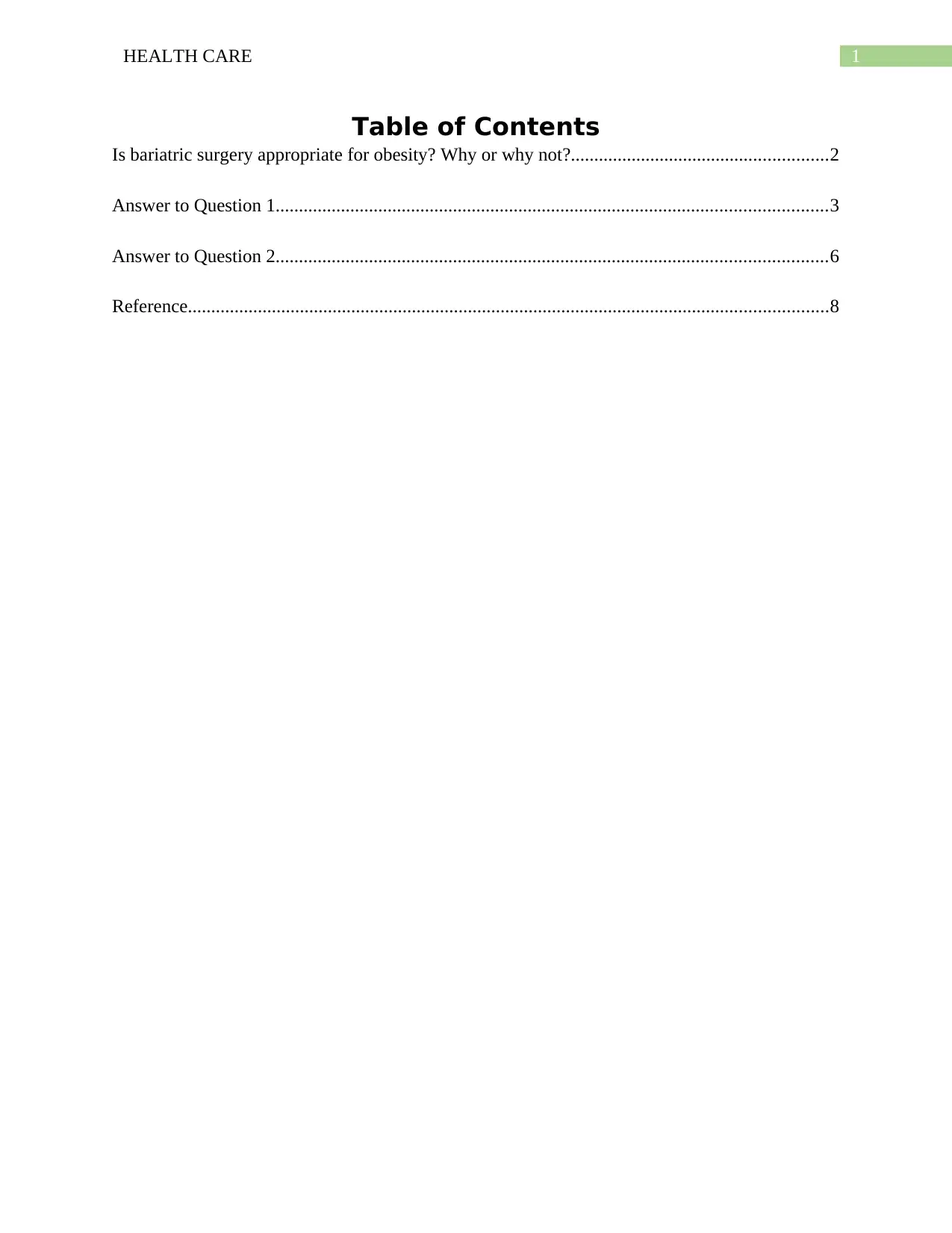
1HEALTH CARE
Table of Contents
Is bariatric surgery appropriate for obesity? Why or why not?.......................................................2
Answer to Question 1......................................................................................................................3
Answer to Question 2......................................................................................................................6
Reference.........................................................................................................................................8
Table of Contents
Is bariatric surgery appropriate for obesity? Why or why not?.......................................................2
Answer to Question 1......................................................................................................................3
Answer to Question 2......................................................................................................................6
Reference.........................................................................................................................................8
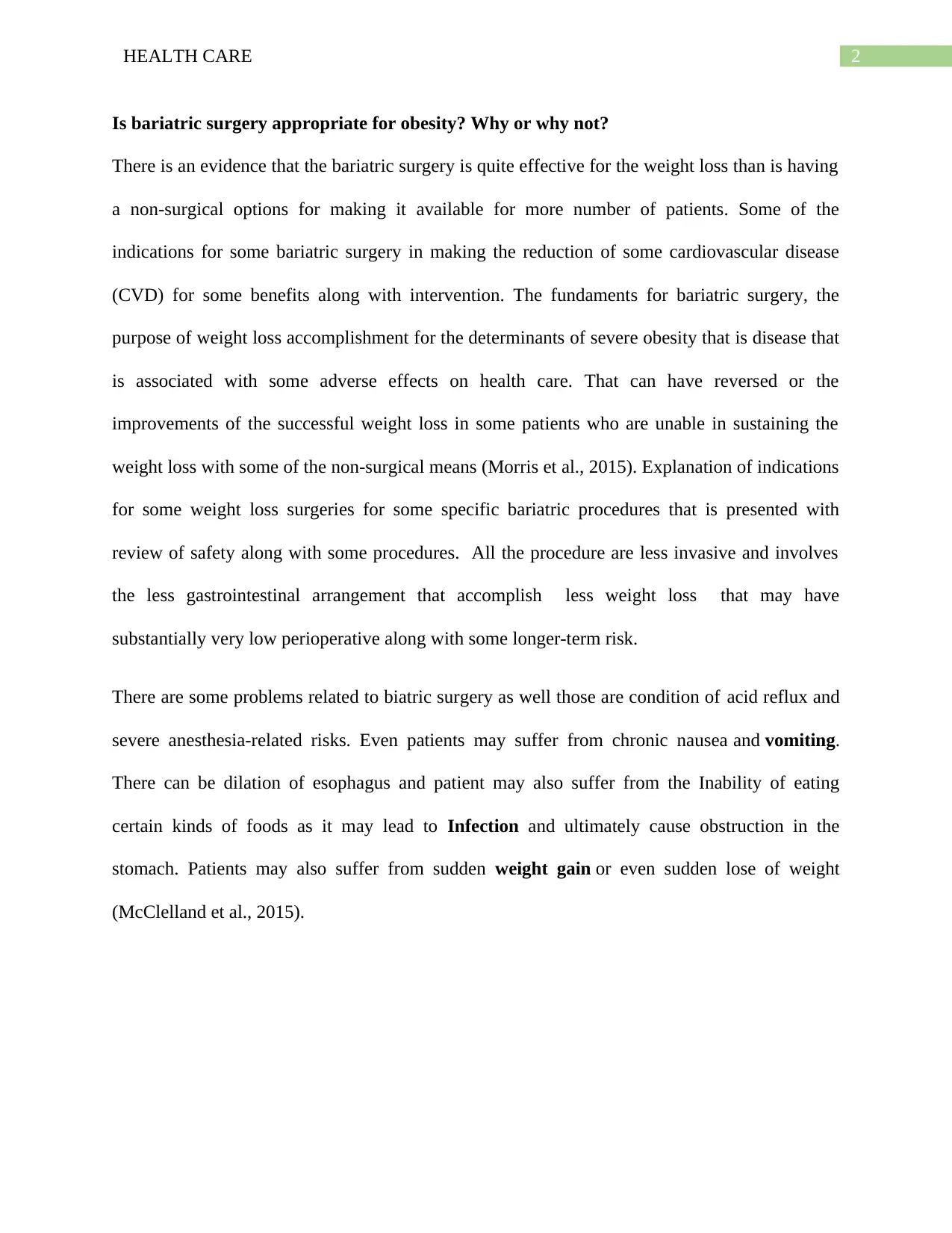
2HEALTH CARE
Is bariatric surgery appropriate for obesity? Why or why not?
There is an evidence that the bariatric surgery is quite effective for the weight loss than is having
a non-surgical options for making it available for more number of patients. Some of the
indications for some bariatric surgery in making the reduction of some cardiovascular disease
(CVD) for some benefits along with intervention. The fundaments for bariatric surgery, the
purpose of weight loss accomplishment for the determinants of severe obesity that is disease that
is associated with some adverse effects on health care. That can have reversed or the
improvements of the successful weight loss in some patients who are unable in sustaining the
weight loss with some of the non-surgical means (Morris et al., 2015). Explanation of indications
for some weight loss surgeries for some specific bariatric procedures that is presented with
review of safety along with some procedures. All the procedure are less invasive and involves
the less gastrointestinal arrangement that accomplish less weight loss that may have
substantially very low perioperative along with some longer-term risk.
There are some problems related to biatric surgery as well those are condition of acid reflux and
severe anesthesia-related risks. Even patients may suffer from chronic nausea and vomiting.
There can be dilation of esophagus and patient may also suffer from the Inability of eating
certain kinds of foods as it may lead to Infection and ultimately cause obstruction in the
stomach. Patients may also suffer from sudden weight gain or even sudden lose of weight
(McClelland et al., 2015).
Is bariatric surgery appropriate for obesity? Why or why not?
There is an evidence that the bariatric surgery is quite effective for the weight loss than is having
a non-surgical options for making it available for more number of patients. Some of the
indications for some bariatric surgery in making the reduction of some cardiovascular disease
(CVD) for some benefits along with intervention. The fundaments for bariatric surgery, the
purpose of weight loss accomplishment for the determinants of severe obesity that is disease that
is associated with some adverse effects on health care. That can have reversed or the
improvements of the successful weight loss in some patients who are unable in sustaining the
weight loss with some of the non-surgical means (Morris et al., 2015). Explanation of indications
for some weight loss surgeries for some specific bariatric procedures that is presented with
review of safety along with some procedures. All the procedure are less invasive and involves
the less gastrointestinal arrangement that accomplish less weight loss that may have
substantially very low perioperative along with some longer-term risk.
There are some problems related to biatric surgery as well those are condition of acid reflux and
severe anesthesia-related risks. Even patients may suffer from chronic nausea and vomiting.
There can be dilation of esophagus and patient may also suffer from the Inability of eating
certain kinds of foods as it may lead to Infection and ultimately cause obstruction in the
stomach. Patients may also suffer from sudden weight gain or even sudden lose of weight
(McClelland et al., 2015).
⊘ This is a preview!⊘
Do you want full access?
Subscribe today to unlock all pages.

Trusted by 1+ million students worldwide
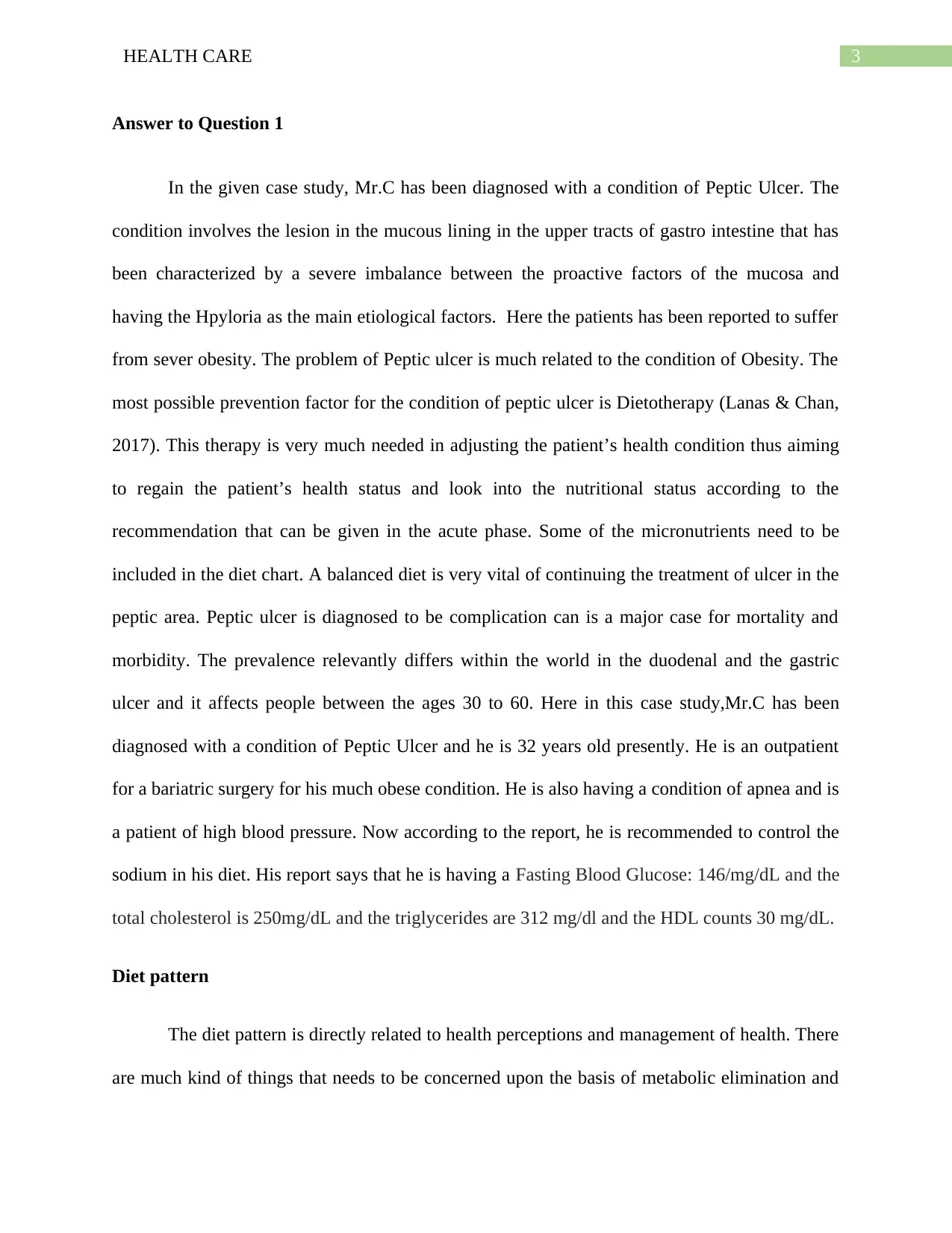
3HEALTH CARE
Answer to Question 1
In the given case study, Mr.C has been diagnosed with a condition of Peptic Ulcer. The
condition involves the lesion in the mucous lining in the upper tracts of gastro intestine that has
been characterized by a severe imbalance between the proactive factors of the mucosa and
having the Hpyloria as the main etiological factors. Here the patients has been reported to suffer
from sever obesity. The problem of Peptic ulcer is much related to the condition of Obesity. The
most possible prevention factor for the condition of peptic ulcer is Dietotherapy (Lanas & Chan,
2017). This therapy is very much needed in adjusting the patient’s health condition thus aiming
to regain the patient’s health status and look into the nutritional status according to the
recommendation that can be given in the acute phase. Some of the micronutrients need to be
included in the diet chart. A balanced diet is very vital of continuing the treatment of ulcer in the
peptic area. Peptic ulcer is diagnosed to be complication can is a major case for mortality and
morbidity. The prevalence relevantly differs within the world in the duodenal and the gastric
ulcer and it affects people between the ages 30 to 60. Here in this case study,Mr.C has been
diagnosed with a condition of Peptic Ulcer and he is 32 years old presently. He is an outpatient
for a bariatric surgery for his much obese condition. He is also having a condition of apnea and is
a patient of high blood pressure. Now according to the report, he is recommended to control the
sodium in his diet. His report says that he is having a Fasting Blood Glucose: 146/mg/dL and the
total cholesterol is 250mg/dL and the triglycerides are 312 mg/dl and the HDL counts 30 mg/dL.
Diet pattern
The diet pattern is directly related to health perceptions and management of health. There
are much kind of things that needs to be concerned upon the basis of metabolic elimination and
Answer to Question 1
In the given case study, Mr.C has been diagnosed with a condition of Peptic Ulcer. The
condition involves the lesion in the mucous lining in the upper tracts of gastro intestine that has
been characterized by a severe imbalance between the proactive factors of the mucosa and
having the Hpyloria as the main etiological factors. Here the patients has been reported to suffer
from sever obesity. The problem of Peptic ulcer is much related to the condition of Obesity. The
most possible prevention factor for the condition of peptic ulcer is Dietotherapy (Lanas & Chan,
2017). This therapy is very much needed in adjusting the patient’s health condition thus aiming
to regain the patient’s health status and look into the nutritional status according to the
recommendation that can be given in the acute phase. Some of the micronutrients need to be
included in the diet chart. A balanced diet is very vital of continuing the treatment of ulcer in the
peptic area. Peptic ulcer is diagnosed to be complication can is a major case for mortality and
morbidity. The prevalence relevantly differs within the world in the duodenal and the gastric
ulcer and it affects people between the ages 30 to 60. Here in this case study,Mr.C has been
diagnosed with a condition of Peptic Ulcer and he is 32 years old presently. He is an outpatient
for a bariatric surgery for his much obese condition. He is also having a condition of apnea and is
a patient of high blood pressure. Now according to the report, he is recommended to control the
sodium in his diet. His report says that he is having a Fasting Blood Glucose: 146/mg/dL and the
total cholesterol is 250mg/dL and the triglycerides are 312 mg/dl and the HDL counts 30 mg/dL.
Diet pattern
The diet pattern is directly related to health perceptions and management of health. There
are much kind of things that needs to be concerned upon the basis of metabolic elimination and
Paraphrase This Document
Need a fresh take? Get an instant paraphrase of this document with our AI Paraphraser
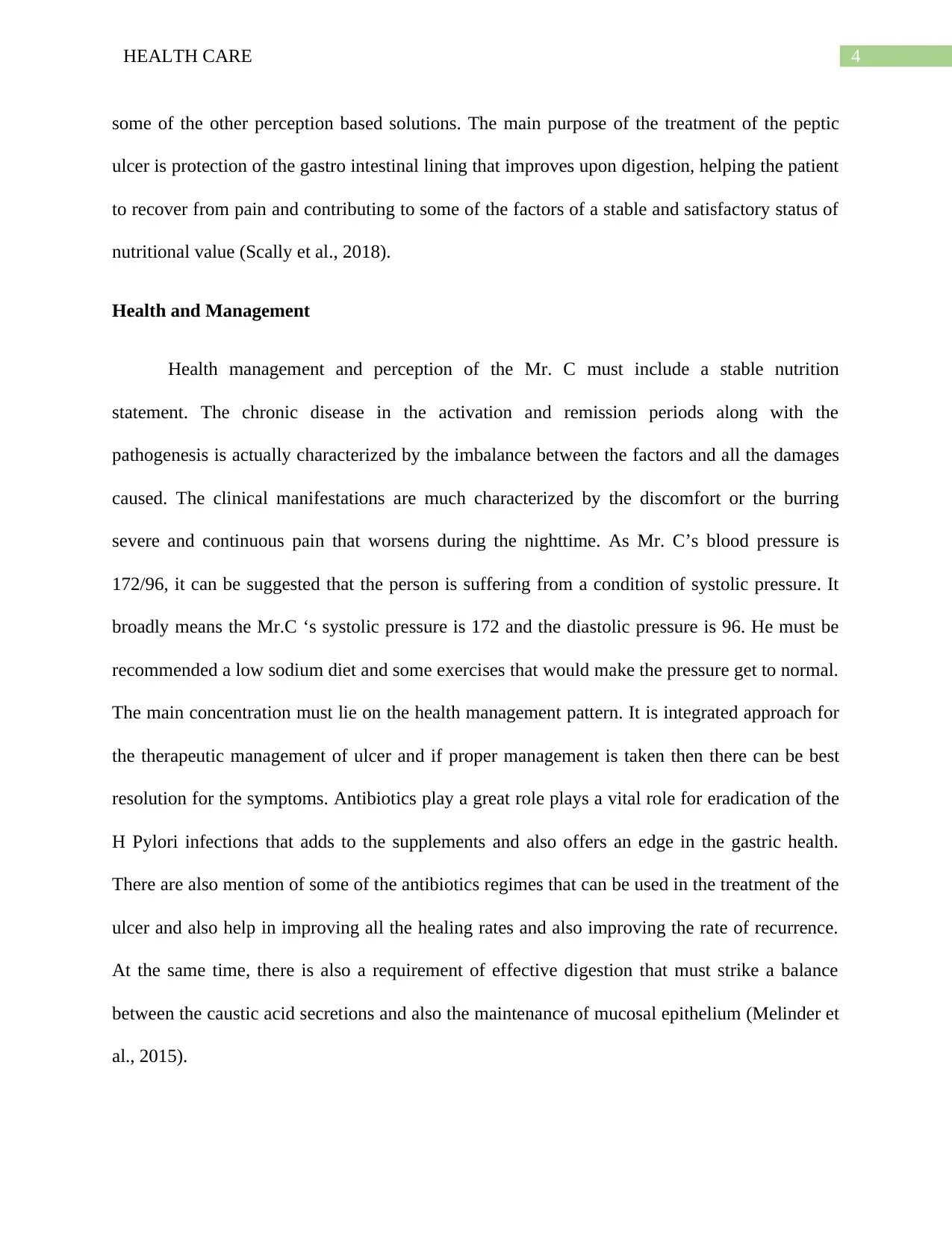
4HEALTH CARE
some of the other perception based solutions. The main purpose of the treatment of the peptic
ulcer is protection of the gastro intestinal lining that improves upon digestion, helping the patient
to recover from pain and contributing to some of the factors of a stable and satisfactory status of
nutritional value (Scally et al., 2018).
Health and Management
Health management and perception of the Mr. C must include a stable nutrition
statement. The chronic disease in the activation and remission periods along with the
pathogenesis is actually characterized by the imbalance between the factors and all the damages
caused. The clinical manifestations are much characterized by the discomfort or the burring
severe and continuous pain that worsens during the nighttime. As Mr. C’s blood pressure is
172/96, it can be suggested that the person is suffering from a condition of systolic pressure. It
broadly means the Mr.C ‘s systolic pressure is 172 and the diastolic pressure is 96. He must be
recommended a low sodium diet and some exercises that would make the pressure get to normal.
The main concentration must lie on the health management pattern. It is integrated approach for
the therapeutic management of ulcer and if proper management is taken then there can be best
resolution for the symptoms. Antibiotics play a great role plays a vital role for eradication of the
H Pylori infections that adds to the supplements and also offers an edge in the gastric health.
There are also mention of some of the antibiotics regimes that can be used in the treatment of the
ulcer and also help in improving all the healing rates and also improving the rate of recurrence.
At the same time, there is also a requirement of effective digestion that must strike a balance
between the caustic acid secretions and also the maintenance of mucosal epithelium (Melinder et
al., 2015).
some of the other perception based solutions. The main purpose of the treatment of the peptic
ulcer is protection of the gastro intestinal lining that improves upon digestion, helping the patient
to recover from pain and contributing to some of the factors of a stable and satisfactory status of
nutritional value (Scally et al., 2018).
Health and Management
Health management and perception of the Mr. C must include a stable nutrition
statement. The chronic disease in the activation and remission periods along with the
pathogenesis is actually characterized by the imbalance between the factors and all the damages
caused. The clinical manifestations are much characterized by the discomfort or the burring
severe and continuous pain that worsens during the nighttime. As Mr. C’s blood pressure is
172/96, it can be suggested that the person is suffering from a condition of systolic pressure. It
broadly means the Mr.C ‘s systolic pressure is 172 and the diastolic pressure is 96. He must be
recommended a low sodium diet and some exercises that would make the pressure get to normal.
The main concentration must lie on the health management pattern. It is integrated approach for
the therapeutic management of ulcer and if proper management is taken then there can be best
resolution for the symptoms. Antibiotics play a great role plays a vital role for eradication of the
H Pylori infections that adds to the supplements and also offers an edge in the gastric health.
There are also mention of some of the antibiotics regimes that can be used in the treatment of the
ulcer and also help in improving all the healing rates and also improving the rate of recurrence.
At the same time, there is also a requirement of effective digestion that must strike a balance
between the caustic acid secretions and also the maintenance of mucosal epithelium (Melinder et
al., 2015).
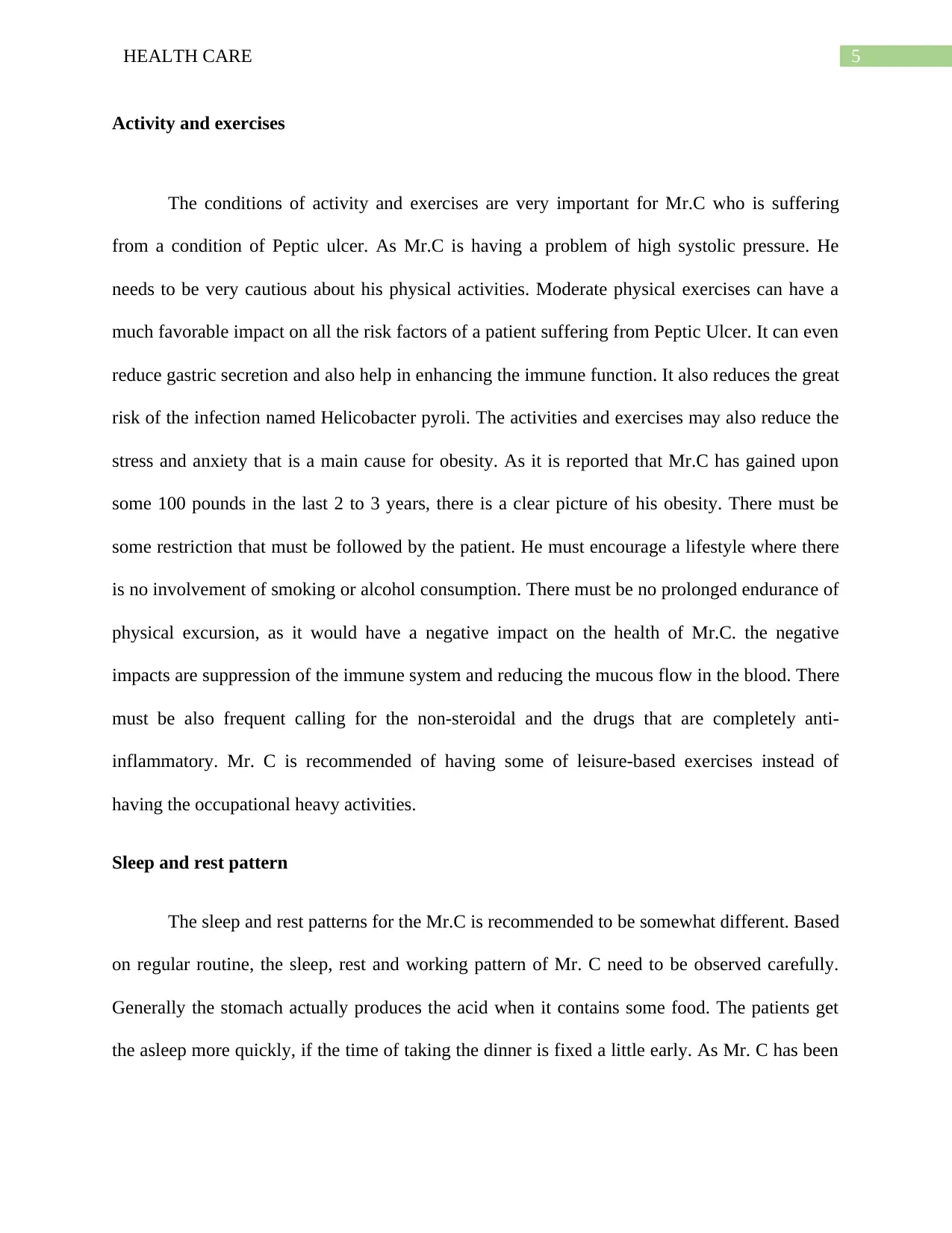
5HEALTH CARE
Activity and exercises
The conditions of activity and exercises are very important for Mr.C who is suffering
from a condition of Peptic ulcer. As Mr.C is having a problem of high systolic pressure. He
needs to be very cautious about his physical activities. Moderate physical exercises can have a
much favorable impact on all the risk factors of a patient suffering from Peptic Ulcer. It can even
reduce gastric secretion and also help in enhancing the immune function. It also reduces the great
risk of the infection named Helicobacter pyroli. The activities and exercises may also reduce the
stress and anxiety that is a main cause for obesity. As it is reported that Mr.C has gained upon
some 100 pounds in the last 2 to 3 years, there is a clear picture of his obesity. There must be
some restriction that must be followed by the patient. He must encourage a lifestyle where there
is no involvement of smoking or alcohol consumption. There must be no prolonged endurance of
physical excursion, as it would have a negative impact on the health of Mr.C. the negative
impacts are suppression of the immune system and reducing the mucous flow in the blood. There
must be also frequent calling for the non-steroidal and the drugs that are completely anti-
inflammatory. Mr. C is recommended of having some of leisure-based exercises instead of
having the occupational heavy activities.
Sleep and rest pattern
The sleep and rest patterns for the Mr.C is recommended to be somewhat different. Based
on regular routine, the sleep, rest and working pattern of Mr. C need to be observed carefully.
Generally the stomach actually produces the acid when it contains some food. The patients get
the asleep more quickly, if the time of taking the dinner is fixed a little early. As Mr. C has been
Activity and exercises
The conditions of activity and exercises are very important for Mr.C who is suffering
from a condition of Peptic ulcer. As Mr.C is having a problem of high systolic pressure. He
needs to be very cautious about his physical activities. Moderate physical exercises can have a
much favorable impact on all the risk factors of a patient suffering from Peptic Ulcer. It can even
reduce gastric secretion and also help in enhancing the immune function. It also reduces the great
risk of the infection named Helicobacter pyroli. The activities and exercises may also reduce the
stress and anxiety that is a main cause for obesity. As it is reported that Mr.C has gained upon
some 100 pounds in the last 2 to 3 years, there is a clear picture of his obesity. There must be
some restriction that must be followed by the patient. He must encourage a lifestyle where there
is no involvement of smoking or alcohol consumption. There must be no prolonged endurance of
physical excursion, as it would have a negative impact on the health of Mr.C. the negative
impacts are suppression of the immune system and reducing the mucous flow in the blood. There
must be also frequent calling for the non-steroidal and the drugs that are completely anti-
inflammatory. Mr. C is recommended of having some of leisure-based exercises instead of
having the occupational heavy activities.
Sleep and rest pattern
The sleep and rest patterns for the Mr.C is recommended to be somewhat different. Based
on regular routine, the sleep, rest and working pattern of Mr. C need to be observed carefully.
Generally the stomach actually produces the acid when it contains some food. The patients get
the asleep more quickly, if the time of taking the dinner is fixed a little early. As Mr. C has been
⊘ This is a preview!⊘
Do you want full access?
Subscribe today to unlock all pages.

Trusted by 1+ million students worldwide
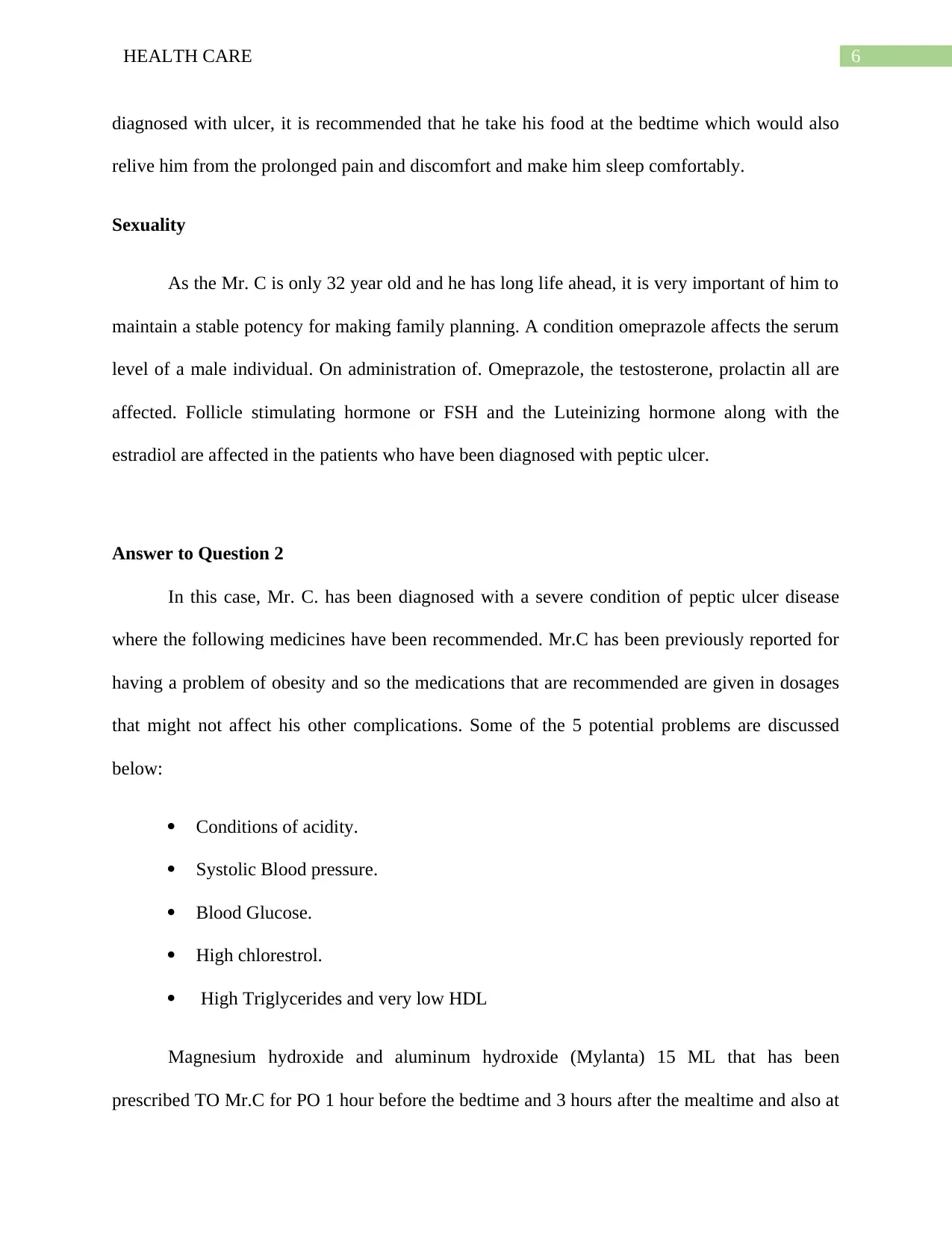
6HEALTH CARE
diagnosed with ulcer, it is recommended that he take his food at the bedtime which would also
relive him from the prolonged pain and discomfort and make him sleep comfortably.
Sexuality
As the Mr. C is only 32 year old and he has long life ahead, it is very important of him to
maintain a stable potency for making family planning. A condition omeprazole affects the serum
level of a male individual. On administration of. Omeprazole, the testosterone, prolactin all are
affected. Follicle stimulating hormone or FSH and the Luteinizing hormone along with the
estradiol are affected in the patients who have been diagnosed with peptic ulcer.
Answer to Question 2
In this case, Mr. C. has been diagnosed with a severe condition of peptic ulcer disease
where the following medicines have been recommended. Mr.C has been previously reported for
having a problem of obesity and so the medications that are recommended are given in dosages
that might not affect his other complications. Some of the 5 potential problems are discussed
below:
Conditions of acidity.
Systolic Blood pressure.
Blood Glucose.
High chlorestrol.
High Triglycerides and very low HDL
Magnesium hydroxide and aluminum hydroxide (Mylanta) 15 ML that has been
prescribed TO Mr.C for PO 1 hour before the bedtime and 3 hours after the mealtime and also at
diagnosed with ulcer, it is recommended that he take his food at the bedtime which would also
relive him from the prolonged pain and discomfort and make him sleep comfortably.
Sexuality
As the Mr. C is only 32 year old and he has long life ahead, it is very important of him to
maintain a stable potency for making family planning. A condition omeprazole affects the serum
level of a male individual. On administration of. Omeprazole, the testosterone, prolactin all are
affected. Follicle stimulating hormone or FSH and the Luteinizing hormone along with the
estradiol are affected in the patients who have been diagnosed with peptic ulcer.
Answer to Question 2
In this case, Mr. C. has been diagnosed with a severe condition of peptic ulcer disease
where the following medicines have been recommended. Mr.C has been previously reported for
having a problem of obesity and so the medications that are recommended are given in dosages
that might not affect his other complications. Some of the 5 potential problems are discussed
below:
Conditions of acidity.
Systolic Blood pressure.
Blood Glucose.
High chlorestrol.
High Triglycerides and very low HDL
Magnesium hydroxide and aluminum hydroxide (Mylanta) 15 ML that has been
prescribed TO Mr.C for PO 1 hour before the bedtime and 3 hours after the mealtime and also at
Paraphrase This Document
Need a fresh take? Get an instant paraphrase of this document with our AI Paraphraser
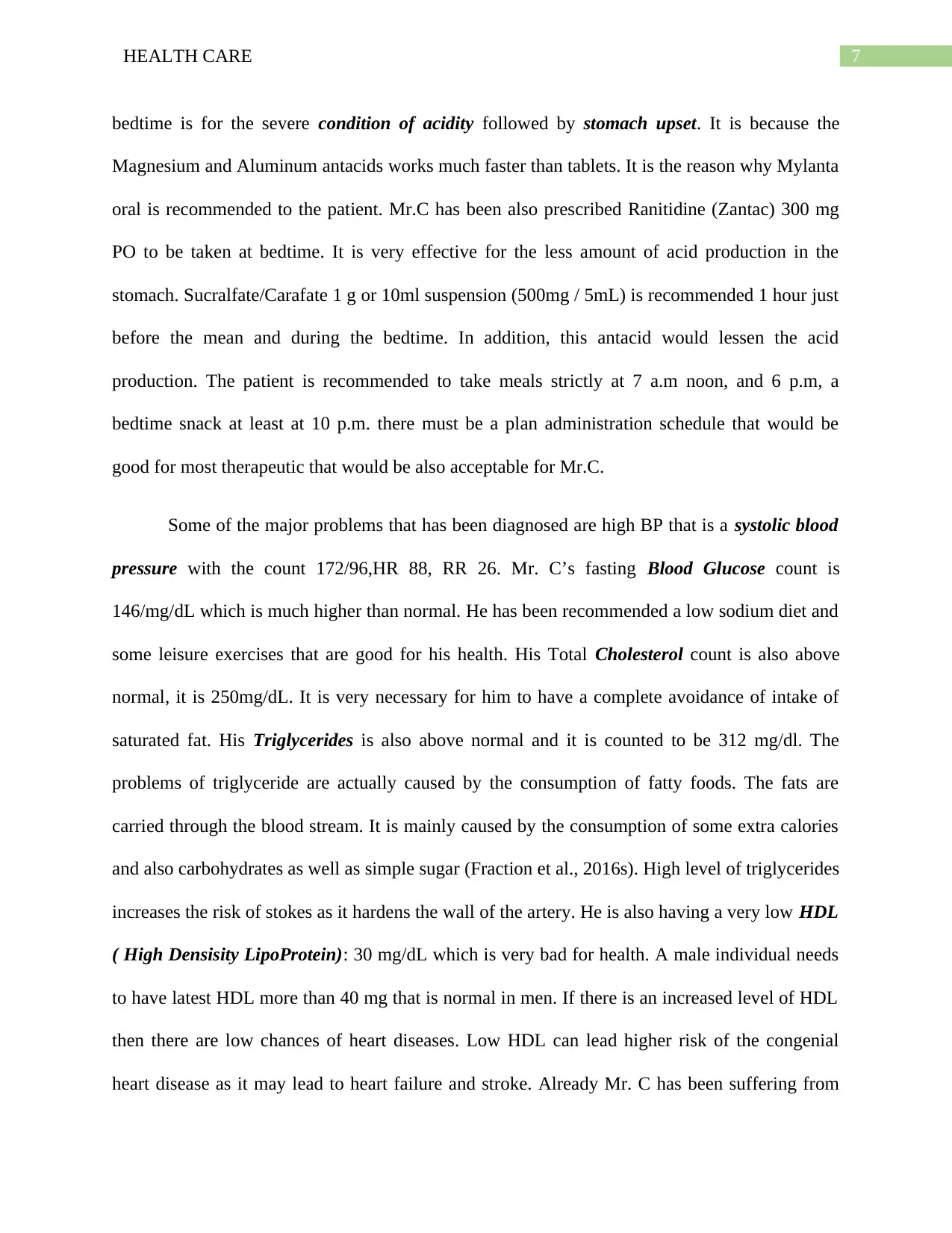
7HEALTH CARE
bedtime is for the severe condition of acidity followed by stomach upset. It is because the
Magnesium and Aluminum antacids works much faster than tablets. It is the reason why Mylanta
oral is recommended to the patient. Mr.C has been also prescribed Ranitidine (Zantac) 300 mg
PO to be taken at bedtime. It is very effective for the less amount of acid production in the
stomach. Sucralfate/Carafate 1 g or 10ml suspension (500mg / 5mL) is recommended 1 hour just
before the mean and during the bedtime. In addition, this antacid would lessen the acid
production. The patient is recommended to take meals strictly at 7 a.m noon, and 6 p.m, a
bedtime snack at least at 10 p.m. there must be a plan administration schedule that would be
good for most therapeutic that would be also acceptable for Mr.C.
Some of the major problems that has been diagnosed are high BP that is a systolic blood
pressure with the count 172/96,HR 88, RR 26. Mr. C’s fasting Blood Glucose count is
146/mg/dL which is much higher than normal. He has been recommended a low sodium diet and
some leisure exercises that are good for his health. His Total Cholesterol count is also above
normal, it is 250mg/dL. It is very necessary for him to have a complete avoidance of intake of
saturated fat. His Triglycerides is also above normal and it is counted to be 312 mg/dl. The
problems of triglyceride are actually caused by the consumption of fatty foods. The fats are
carried through the blood stream. It is mainly caused by the consumption of some extra calories
and also carbohydrates as well as simple sugar (Fraction et al., 2016s). High level of triglycerides
increases the risk of stokes as it hardens the wall of the artery. He is also having a very low HDL
( High Densisity LipoProtein): 30 mg/dL which is very bad for health. A male individual needs
to have latest HDL more than 40 mg that is normal in men. If there is an increased level of HDL
then there are low chances of heart diseases. Low HDL can lead higher risk of the congenial
heart disease as it may lead to heart failure and stroke. Already Mr. C has been suffering from
bedtime is for the severe condition of acidity followed by stomach upset. It is because the
Magnesium and Aluminum antacids works much faster than tablets. It is the reason why Mylanta
oral is recommended to the patient. Mr.C has been also prescribed Ranitidine (Zantac) 300 mg
PO to be taken at bedtime. It is very effective for the less amount of acid production in the
stomach. Sucralfate/Carafate 1 g or 10ml suspension (500mg / 5mL) is recommended 1 hour just
before the mean and during the bedtime. In addition, this antacid would lessen the acid
production. The patient is recommended to take meals strictly at 7 a.m noon, and 6 p.m, a
bedtime snack at least at 10 p.m. there must be a plan administration schedule that would be
good for most therapeutic that would be also acceptable for Mr.C.
Some of the major problems that has been diagnosed are high BP that is a systolic blood
pressure with the count 172/96,HR 88, RR 26. Mr. C’s fasting Blood Glucose count is
146/mg/dL which is much higher than normal. He has been recommended a low sodium diet and
some leisure exercises that are good for his health. His Total Cholesterol count is also above
normal, it is 250mg/dL. It is very necessary for him to have a complete avoidance of intake of
saturated fat. His Triglycerides is also above normal and it is counted to be 312 mg/dl. The
problems of triglyceride are actually caused by the consumption of fatty foods. The fats are
carried through the blood stream. It is mainly caused by the consumption of some extra calories
and also carbohydrates as well as simple sugar (Fraction et al., 2016s). High level of triglycerides
increases the risk of stokes as it hardens the wall of the artery. He is also having a very low HDL
( High Densisity LipoProtein): 30 mg/dL which is very bad for health. A male individual needs
to have latest HDL more than 40 mg that is normal in men. If there is an increased level of HDL
then there are low chances of heart diseases. Low HDL can lead higher risk of the congenial
heart disease as it may lead to heart failure and stroke. Already Mr. C has been suffering from
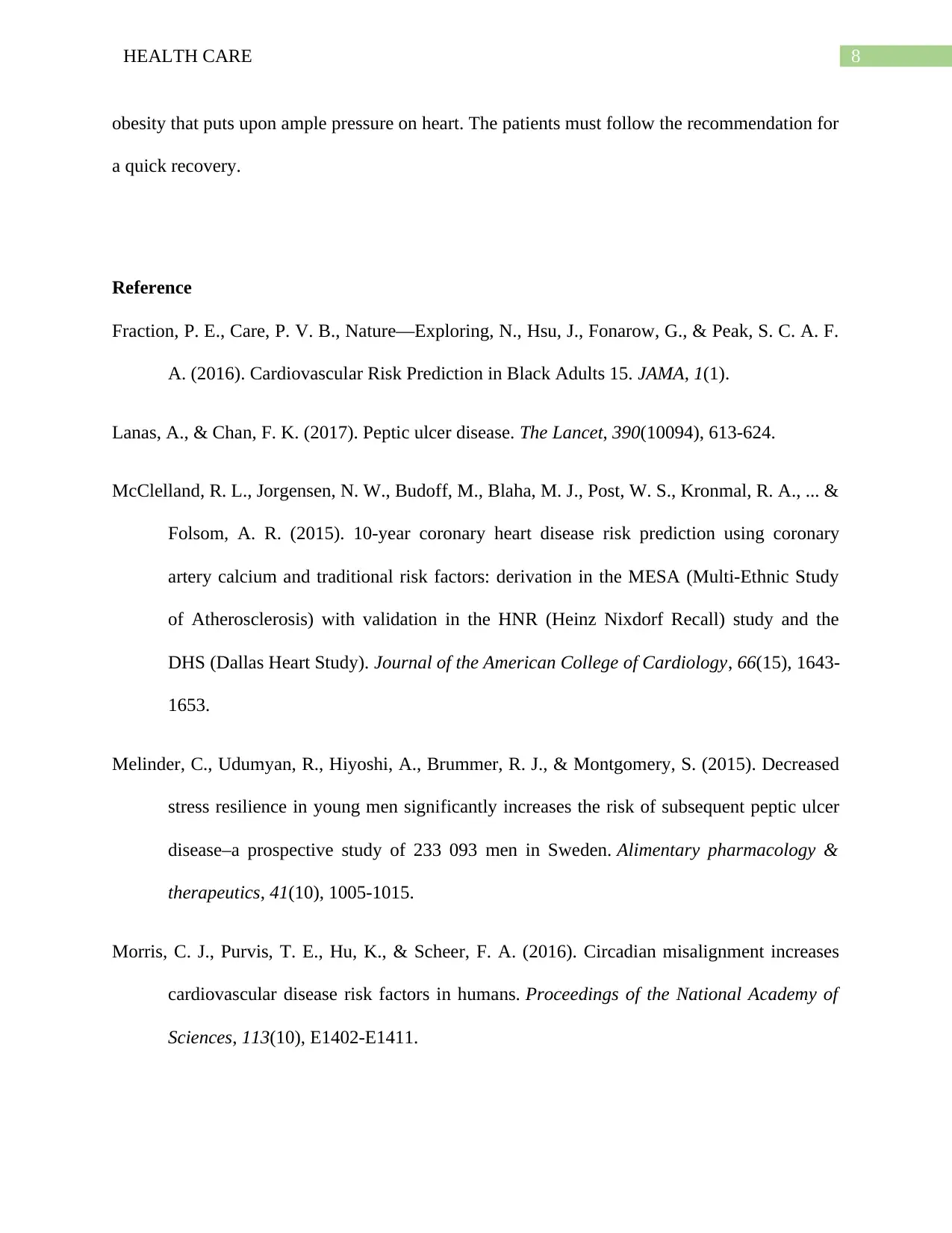
8HEALTH CARE
obesity that puts upon ample pressure on heart. The patients must follow the recommendation for
a quick recovery.
Reference
Fraction, P. E., Care, P. V. B., Nature—Exploring, N., Hsu, J., Fonarow, G., & Peak, S. C. A. F.
A. (2016). Cardiovascular Risk Prediction in Black Adults 15. JAMA, 1(1).
Lanas, A., & Chan, F. K. (2017). Peptic ulcer disease. The Lancet, 390(10094), 613-624.
McClelland, R. L., Jorgensen, N. W., Budoff, M., Blaha, M. J., Post, W. S., Kronmal, R. A., ... &
Folsom, A. R. (2015). 10-year coronary heart disease risk prediction using coronary
artery calcium and traditional risk factors: derivation in the MESA (Multi-Ethnic Study
of Atherosclerosis) with validation in the HNR (Heinz Nixdorf Recall) study and the
DHS (Dallas Heart Study). Journal of the American College of Cardiology, 66(15), 1643-
1653.
Melinder, C., Udumyan, R., Hiyoshi, A., Brummer, R. J., & Montgomery, S. (2015). Decreased
stress resilience in young men significantly increases the risk of subsequent peptic ulcer
disease–a prospective study of 233 093 men in Sweden. Alimentary pharmacology &
therapeutics, 41(10), 1005-1015.
Morris, C. J., Purvis, T. E., Hu, K., & Scheer, F. A. (2016). Circadian misalignment increases
cardiovascular disease risk factors in humans. Proceedings of the National Academy of
Sciences, 113(10), E1402-E1411.
obesity that puts upon ample pressure on heart. The patients must follow the recommendation for
a quick recovery.
Reference
Fraction, P. E., Care, P. V. B., Nature—Exploring, N., Hsu, J., Fonarow, G., & Peak, S. C. A. F.
A. (2016). Cardiovascular Risk Prediction in Black Adults 15. JAMA, 1(1).
Lanas, A., & Chan, F. K. (2017). Peptic ulcer disease. The Lancet, 390(10094), 613-624.
McClelland, R. L., Jorgensen, N. W., Budoff, M., Blaha, M. J., Post, W. S., Kronmal, R. A., ... &
Folsom, A. R. (2015). 10-year coronary heart disease risk prediction using coronary
artery calcium and traditional risk factors: derivation in the MESA (Multi-Ethnic Study
of Atherosclerosis) with validation in the HNR (Heinz Nixdorf Recall) study and the
DHS (Dallas Heart Study). Journal of the American College of Cardiology, 66(15), 1643-
1653.
Melinder, C., Udumyan, R., Hiyoshi, A., Brummer, R. J., & Montgomery, S. (2015). Decreased
stress resilience in young men significantly increases the risk of subsequent peptic ulcer
disease–a prospective study of 233 093 men in Sweden. Alimentary pharmacology &
therapeutics, 41(10), 1005-1015.
Morris, C. J., Purvis, T. E., Hu, K., & Scheer, F. A. (2016). Circadian misalignment increases
cardiovascular disease risk factors in humans. Proceedings of the National Academy of
Sciences, 113(10), E1402-E1411.
⊘ This is a preview!⊘
Do you want full access?
Subscribe today to unlock all pages.

Trusted by 1+ million students worldwide
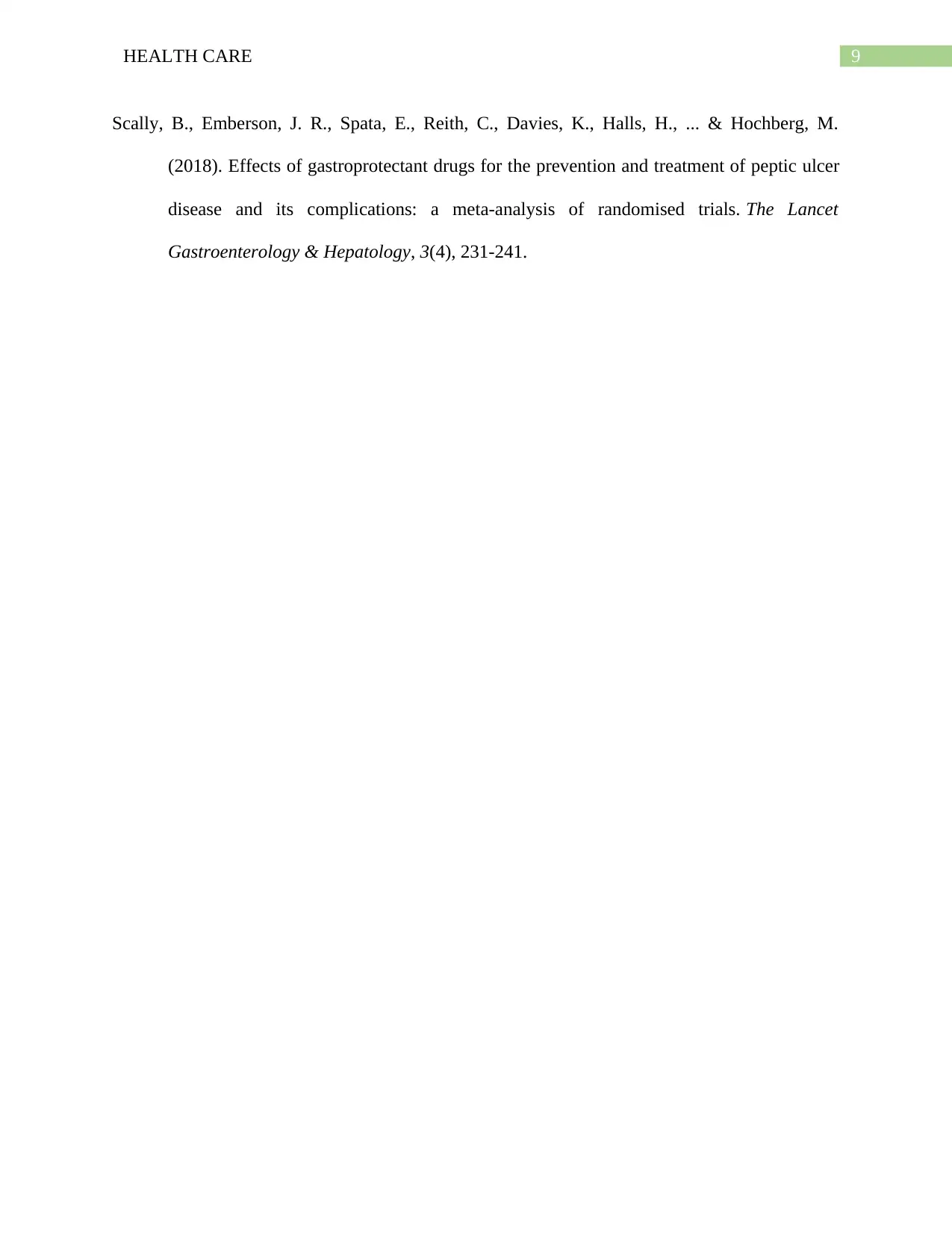
9HEALTH CARE
Scally, B., Emberson, J. R., Spata, E., Reith, C., Davies, K., Halls, H., ... & Hochberg, M.
(2018). Effects of gastroprotectant drugs for the prevention and treatment of peptic ulcer
disease and its complications: a meta-analysis of randomised trials. The Lancet
Gastroenterology & Hepatology, 3(4), 231-241.
Scally, B., Emberson, J. R., Spata, E., Reith, C., Davies, K., Halls, H., ... & Hochberg, M.
(2018). Effects of gastroprotectant drugs for the prevention and treatment of peptic ulcer
disease and its complications: a meta-analysis of randomised trials. The Lancet
Gastroenterology & Hepatology, 3(4), 231-241.
1 out of 10
Related Documents
Your All-in-One AI-Powered Toolkit for Academic Success.
+13062052269
info@desklib.com
Available 24*7 on WhatsApp / Email
![[object Object]](/_next/static/media/star-bottom.7253800d.svg)
Unlock your academic potential
Copyright © 2020–2025 A2Z Services. All Rights Reserved. Developed and managed by ZUCOL.





